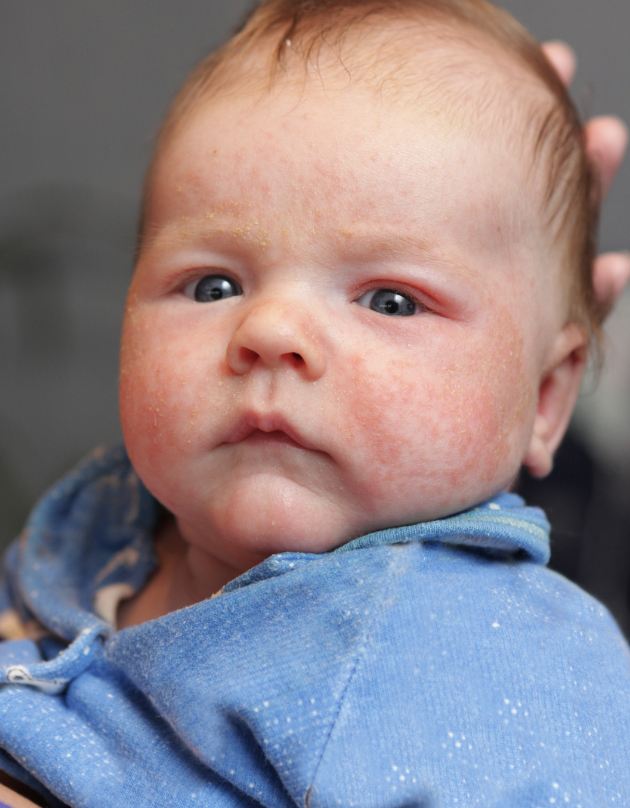The Role of Genetics in Treatment Resistant Eczema
Children with a strong family history of eczema often experience more severe eczema symptoms. In these cases, we need to pay particularly attention to the role genetics can play in treatment resistant eczema. Specific gene mutations, such as those affecting the CARD11 gene, play a huge role in the development of and persistence of eczema.
How Genetics Influence Eczema Severity
Eczema is often seen in families, indicating that genetic factors play a role in the likelihood of developing the condition. Mutations in genes that affect the skin barrier, immune system function, and inflammatory response can lead to a more severe, treatment resistant form of eczema. One of the most researched genetic mutations related to severe eczema is found in the CARD11 gene, which has a significant impact on both the immune response and skin health.
The CARD11 Mutation: A Key Player in Treatment Resistant Eczema
The CARD11 gene plays a crucial role in the immune system by helping to regulate immune cell activation. When this gene is mutated, it can lead to dysregulation of the immune system, resulting in an exaggerated inflammatory response. This overactive immune response is a hallmark of severe eczema, where the body’s immune cells mistakenly attack the skin, leading to chronic inflammation, dryness, and difficulty in healing.
- Skin Barrier Dysfunction: Children with CARD11 mutations often experience impaired skin barrier function. This means their skin is less effective at retaining moisture and more prone to allowing irritants, allergens, and bacteria to penetrate the deeper layers of the skin. The result is a continuous cycle of inflammation and damage, which makes it harder for the skin to heal and contributes to treatment resistance.
- Chronic Inflammation: CARD11 mutations lead to an overactive immune system, causing persistent inflammation in the skin. This chronic inflammation not only worsens eczema symptoms but also makes it difficult to control with standard treatments like topical corticosteroids or moisturisers. The immune system’s inability to regulate inflammation properly means that eczema flares become more frequent and severe.
- Early Onset and Resistance to Treatment: Children with CARD11 mutations often show signs of eczema very early in life, often before six months of age. This early onset is typically associated with more severe symptoms and a resistance to conventional treatments. Standard therapies, such as topical steroids, may offer only temporary relief, as they do not address the underlying immune dysfunction caused by the genetic mutation.
Other Genetic Factors Linked to Eczema
- The Role of the Filaggrin (FLG) Gene: While the CARD11 mutation is a significant contributor to treatment resistant eczema, other genetic factors can also play a role. For example, mutations in the filaggrin (FLG) gene affect the skin’s ability to maintain a healthy barrier, making individuals more susceptible to both eczema and asthma. These genetic mutations often work together, creating a complex interplay of skin barrier dysfunction and immune system dysregulation.
Identifying Genetic Causes of Eczema
When a child presents with severe eczema, particularly if it appears early in life or is resistant to treatment, exploring the possibility of genetic causes is essential. A thorough family history, combined with genetic testing in some cases, can help identify mutations like CARD11 that may be contributing to the condition. Understanding the genetic basis of eczema can lead to more targeted and effective treatments.
Managing Eczema in Children with Genetic Mutations
Children with genetic mutations linked to eczema often require more advanced treatment strategies than those with milder forms of the condition;
- Targeted Therapies: In cases where genetic mutations like CARD11 are identified, targeted therapies that address the underlying immune system dysfunction may be necessary. These treatments can include specific probiotic therapies, herbal medicine and nutraceuticals that help regulate the immune response and reduce inflammation.
- Barrier Repair: Given that children with CARD11 mutations often have impaired skin barrier function, treatments that focus on restoring and protecting the skin barrier are essential. This can include the use of emollients and barrier repair creams with ingredients like ceramides, golden seal, zinc, N-acetyl cysteine, Vitamin E, Vitamin D, Vitamin B12, and fatty acids that help lock in moisture and retrain the skin barrier.
- Advanced Skincare Regimens: Children with severe, genetically influenced eczema may benefit from specialised skincare routines that include both moisturising and anti-inflammatory components. These regimens can be customised to their specific skin needs and adjusted as flare ups occur.
Addressing Genetic Factors for Better Eczema Management
Genetic factors can play a significant role in the development and persistence of treatment resistant eczema. By understanding the genetic causes of eczema, we can develop personalised treatment plans that target the underlying cause of the problem, offering children better relief from severe eczema symptoms. Identifying genetic predispositions early can help guide effective management strategies and improve the quality of life for children suffering from severe eczema.
– Ash Yates, Children’s Health Naturopath

